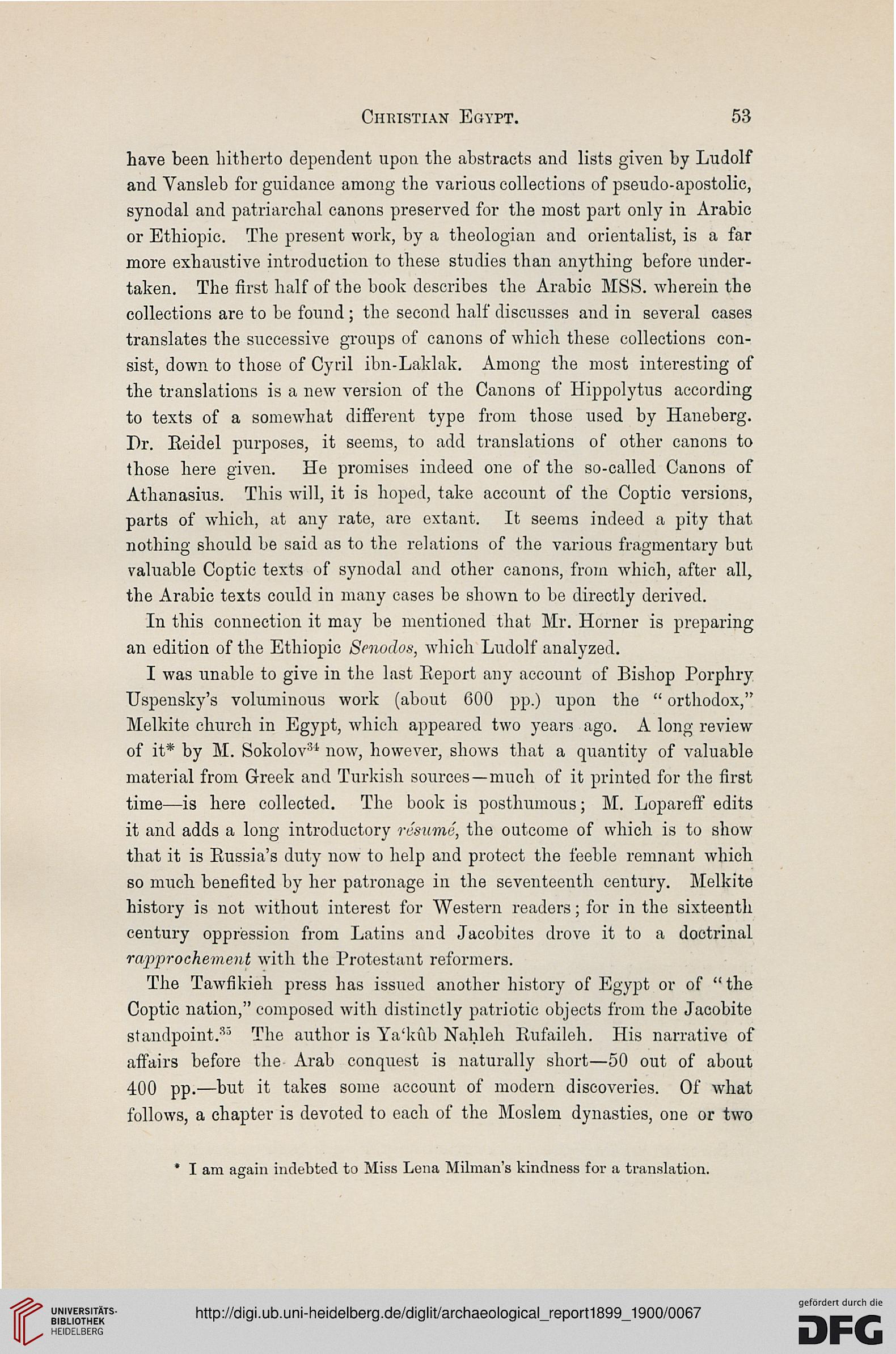Christian Egypt.
53
have been hitherto dependent upon the abstracts and lists given by Ludolf
and Vansleb for guidance among the various collections of pseudo-apostolic,
synodal and patriarchal canons preserved for the most part only in Arabic
or Ethiopia. The present work, by a theologian and orientalist, is a far
more exhaustive introduction to these studies than anything before under-
taken. The first half of the book describes the Arabic MSS. wherein the
collections are to be found; the second half discusses and in several cases
translates the successive groups of canons of which these collections con-
sist, down to those of Cyril ibn-Laklak. Among the most interesting of
the translations is a new version of the Canons of Hippolytus according
to texts of a somewhat different type from those used by Haneberg.
Dr. Eeidel purposes, it seems, to add translations of other canons to
those here given. He promises indeed one of the so-called Canons of
Athanasius. This will, it is hoped, take account of the Coptic versions,
parts of which, at any rate, are extant. It seems indeed a pity that
nothing should be said as to the relations of the various fragmentary but
valuable Coptic texts of synodal and other canons, from which, after all,
the Arabic texts could in many cases be shown to be directly derived.
In this connection it may be mentioned that Mr. Horner is preparing
an edition of the Ethiopic Smodos, which Ludolf analyzed.
I was unable to give in the last Report any account of Bishop Porphry
Uspensky's voluminous work (about 600 pp.) upon the " orthodox,"
Melkite church in Egypt, which appeared two years ago. A long review
of it* by M. Sokolov31 now, however, shows that a quantity of valuable
material from Greek and Turkish sources —much of it printed for the first
time—is here collected. The book is posthumous; M. Lopareff edits
it and adds a long introductory risximi, the outcome of which is to show
that it is Russia's duty now to help and protect the feeble remnant which
so much benefited by her patronage in the seventeenth century. Melkite
history is not without interest for Western readers; for in the sixteenth
century oppression from Latins and Jacobites drove it to a doctrinal
rajiprochement with the Protestant reformers.
The Tawfikieh press has issued another history of Egypt or of " the
Coptic nation," composed with distinctly patriotic objects from the Jacobite
standpoint.3"' The author is Ya'kub Nahleh Rufaileh. His narrative of
affairs before the Arab conquest is naturally short—50 out of about
400 pp.—but it takes some account of modern discoveries. Of what
follows, a chapter is devoted to each of the Moslem dynasties, one or two
* I am again indebted to Miss Lena Milman's kindness for a translation.
53
have been hitherto dependent upon the abstracts and lists given by Ludolf
and Vansleb for guidance among the various collections of pseudo-apostolic,
synodal and patriarchal canons preserved for the most part only in Arabic
or Ethiopia. The present work, by a theologian and orientalist, is a far
more exhaustive introduction to these studies than anything before under-
taken. The first half of the book describes the Arabic MSS. wherein the
collections are to be found; the second half discusses and in several cases
translates the successive groups of canons of which these collections con-
sist, down to those of Cyril ibn-Laklak. Among the most interesting of
the translations is a new version of the Canons of Hippolytus according
to texts of a somewhat different type from those used by Haneberg.
Dr. Eeidel purposes, it seems, to add translations of other canons to
those here given. He promises indeed one of the so-called Canons of
Athanasius. This will, it is hoped, take account of the Coptic versions,
parts of which, at any rate, are extant. It seems indeed a pity that
nothing should be said as to the relations of the various fragmentary but
valuable Coptic texts of synodal and other canons, from which, after all,
the Arabic texts could in many cases be shown to be directly derived.
In this connection it may be mentioned that Mr. Horner is preparing
an edition of the Ethiopic Smodos, which Ludolf analyzed.
I was unable to give in the last Report any account of Bishop Porphry
Uspensky's voluminous work (about 600 pp.) upon the " orthodox,"
Melkite church in Egypt, which appeared two years ago. A long review
of it* by M. Sokolov31 now, however, shows that a quantity of valuable
material from Greek and Turkish sources —much of it printed for the first
time—is here collected. The book is posthumous; M. Lopareff edits
it and adds a long introductory risximi, the outcome of which is to show
that it is Russia's duty now to help and protect the feeble remnant which
so much benefited by her patronage in the seventeenth century. Melkite
history is not without interest for Western readers; for in the sixteenth
century oppression from Latins and Jacobites drove it to a doctrinal
rajiprochement with the Protestant reformers.
The Tawfikieh press has issued another history of Egypt or of " the
Coptic nation," composed with distinctly patriotic objects from the Jacobite
standpoint.3"' The author is Ya'kub Nahleh Rufaileh. His narrative of
affairs before the Arab conquest is naturally short—50 out of about
400 pp.—but it takes some account of modern discoveries. Of what
follows, a chapter is devoted to each of the Moslem dynasties, one or two
* I am again indebted to Miss Lena Milman's kindness for a translation.





